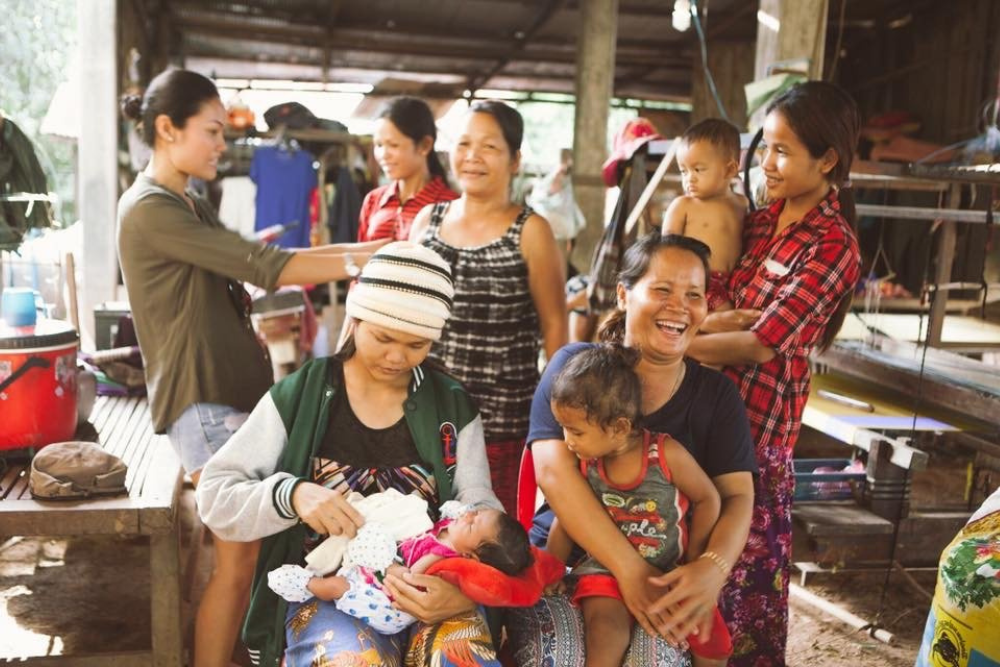The team of weavers at Krama&Co laughing in their workshop. Credits: Krama&Co
The world of business is still very much a man’s, man’s world.
In many developing nations, power imbalances and higher poverty rates mean that women’s roles are largely unrecognized, with many women expected to carry out unpaid work.
But time and time again, research has shown that closing gender gaps benefits countries as a whole, not just women and girls. When women have equal access to education and health, economic opportunities, and a voice within households and society, we all thrive.
This International Women’s Day, we’re championing the wahine who are often overlooked from the mainstream “women’s empowerment” narrative: the women who make the products we cherish. We spoke to two Kiwi brands, Krama&Co and Above Rubies about how they are #BreakingTheBias and enabling women in Southeast Asia to build better lives through ethical trade.
Rebecca Parnham founded Krama&Co after a trip to Cambodia opened her eyes to the struggles of Cambodian women living in poverty. She was on a bamboo train when she noticed a woman who had made a bike seat for her baby using a Karma.
“A light bulb went off for me. I could see that a way to support women in Cambodia was to use, sell and celebrate their national symbol, the krama.”
She connected with Nita Pennell, a local businesswoman who now runs the Cambodian side of the operation. Nita’s role is vital in ensuring the working conditions and ethics of the business are of the highest standard. She has formed strong relationships with the weavers and usually goes out to the village with her friends and family to spend the day.
Learn more about Krama&Co’s beautiful mission here.
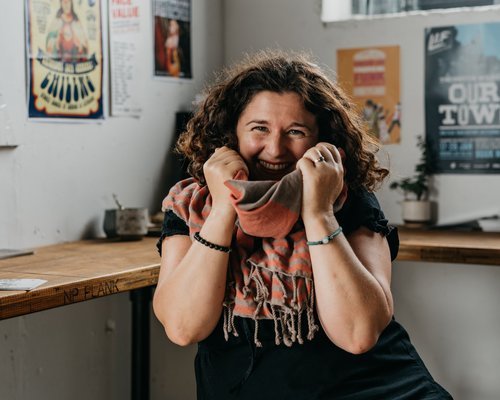
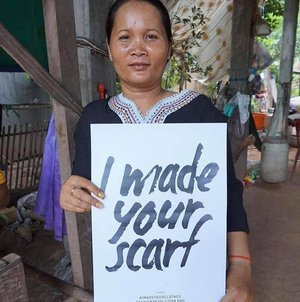
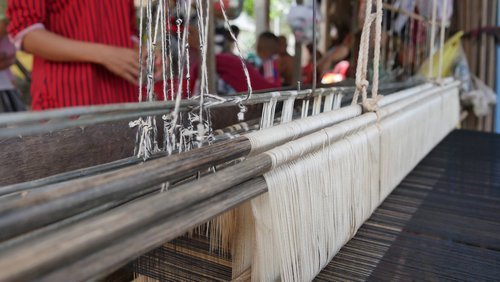
At fair&good, we love connecting our community to the people who make their products. Could you tell us about your team of artisans?
Our weavers are a talented group of women who are combining craft with a very contemporary look. Many have learnt how to weave from family members and are carrying on the tradition. They choose their colour combinations and designs and we simply celebrate them. They are committed to supporting their community with many of them saying that the village fund is their favourite part of trading with Krama & Co.
The thing that connects us all at Krama & Co. is that we are all smart, astute businesswomen who put out children first. Our weavers did not ask for more money, rather they asked for a ‘village fund’ – which is their favourite part. Like any other woman in any other part of the world, when they get doctors visiting they make sure the elderly and children are seen first. They get up every day and get their kids ready before starting work for the day. We speak the same language – business, family and humanity. We have to make money to survive but we all want to use the money we make to make a difference.
When did you realise that Krama&Co was making an impact on the lives of your artisans?
The day my partner Nita sent photos from the village when the ‘village fund’ funded a medical team to spend the day in the village. The women were proud to be able to provide this. Those days were very social days with many villagers coming together to see the doctors and catch up. During the lockdown last year when food was scarce we were able to move quickly to get food into the village and feed everyone.
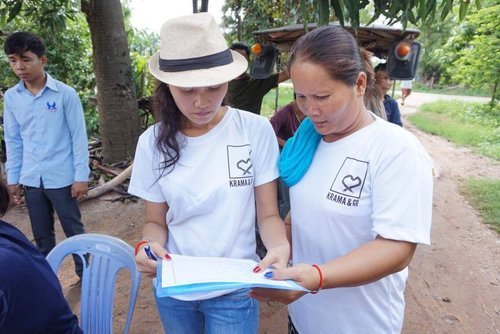
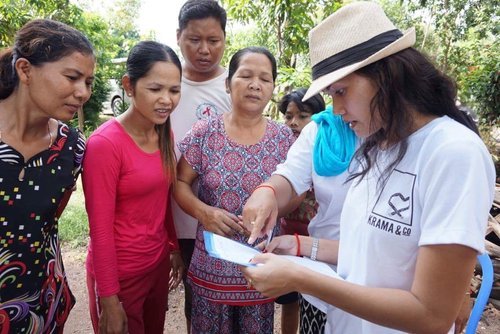
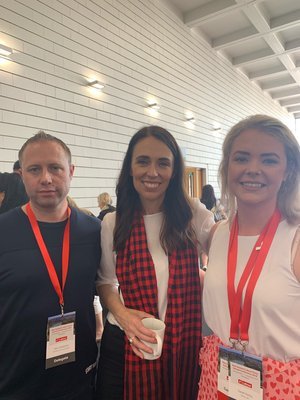
Is there a particular memory or moment that stood out during your time in Cambodia?
Standing at the killing tree in the killing fields where the children were killed really impacted me. It was juxtaposed with days spent around so many welcoming and smiling Cambodians.
What does women’s empowerment mean to you?
It means enabling women with the opportunity to have choices. Our ladies are skilled artisans who we trade with. We do not give them handouts, they are not a charity case. They are the ones who are supporting their community and they get to decide how the money is spent.
I leave the decisions in Cambodia to Nita and Molly. I send the money when they have negotiated with the medical team or the way of getting in money for food. They know what’s best for their community and I trust them to make that call. Nita has developed good relationships in the village and is key to all that we do.
What’s one thing we can do to #BreakTheBias and create an equitable world for women?
Get to know different women and look beyond the stereotype. Right now, we make too many assumptions. One thing I have always found funny is the assumption that I am the wealthy one. I am not. I do, however, recognise my privilege. Nita is just as educated as me and a much more astute businesswoman. She is also far more glamorous than me. Our ladies are the star designers. Nita and I are just the ones who are creating a market in New Zealand for them and celebrating their skills.
We use our social media to celebrate and educate. We admire these women and we are bringing up amazing young women.
I have accepted that we are having to run a long race in terms of combating negative stereotypes. We are essentially building a picture of our ladies and their product. We don’t show their day to day life and their poverty. Instead, we show beautiful snippets of family, joy, friendship and laughter. We acknowledge that life is hard but make sure the product, their product, is the star. I have photos of how hard life is but I choose not to show them.
We make sure our posts are a celebration and admiration every time. We rely on incrementally gaining the trust of customers that we are doing what we say but we are not going to exploit our ladies to do so.
After seeing first-hand the pressure that single mothers face in the Philippines, Angela Hughes and her daughter started a livelihood project to provide work security, dignity and hope to women faced with challenging life circumstances.
“We love seeing the smiles of people when they see the work of our six amazing artisans and the joy and security that this work brings for the ladies in the Philippines.”
The Above Rubie artisans also make decisions on how to help other single mothers in the city of Baguio. They give rice regularly to help others from the profits and run events to encourage other women and help them with food. They also run training sessions in crochet.
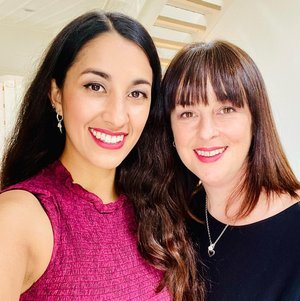
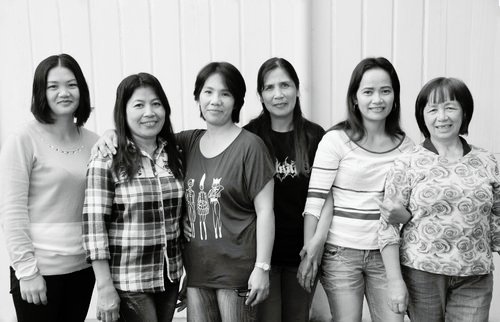
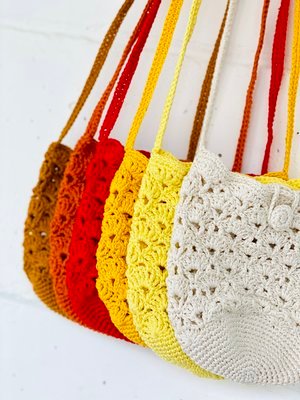
At fair&good, we love connecting our community to the people who make their products. Could you tell us about your team of artisans?
Our team consists of a Kiwi Mother and daughter duo managing an amazing core group of six single mothers in the mountainous city of Baguio, Philippines.
In recent months we’ve been able to expand the project to help more single mothers on a seasonal basis as product demand has increased. Our project began with paper bead jewellery but has branched out in recent years to crochet products.
When did you realise that Krama&Co was making an impact on the lives of your artisans?
We began seeing an impact in 2011. Past employment for these ladies had been unreliable, low-paying and physically strenuous. They had no choice but to do jobs like laundry and sorting through rubbish just to put food on the table. They had little confidence in themselves or pride in their work when they first started working with us. They hardly spoke and were hesitant when it came to sharing new ideas or thoughts.
It wasn’t long though before we began to see the impact Above Rubies was making on the women. Now, our artisans feel empowered and confident they can provide for their families using their talents and skills.
What’s your favourite memory or moment of Above Rubies been so far?
I love hearing the ladies chatting and laughing in their workroom each day. It’s moments like these that remind me of their transformation and who they have become.
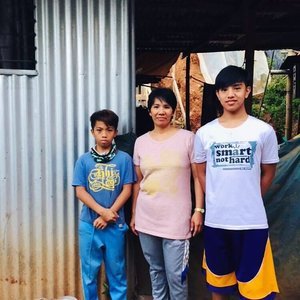
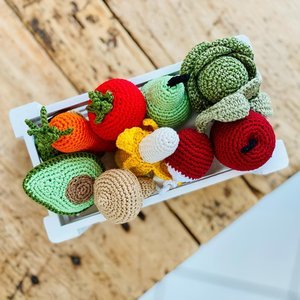
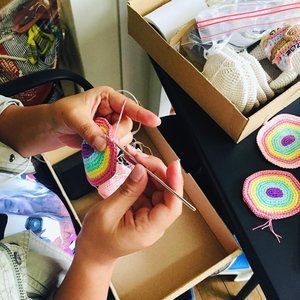
What does women’s empowerment mean to you?
Women’s empowerment means providing a supportive environment where women can grow, be themselves and reach their highest potential. Above Rubies not only provides employment but encourages artisans to be confident in who they are and the art they create. When women are empowered, they go on to empower others which makes virtually anything possible!
What’s one thing we can do to #BreakTheBias and create an equitable world for women?
Never underestimate what a woman can achieve. There’s a strange, unspoken mentality in society that women aren’t as strong, capable and stable as men but this simply isn’t true.
Trust a woman to do great things and she will do that, and more.
YOU have the power to make a positive difference. Will you take action? Image credits: Holi Boli

